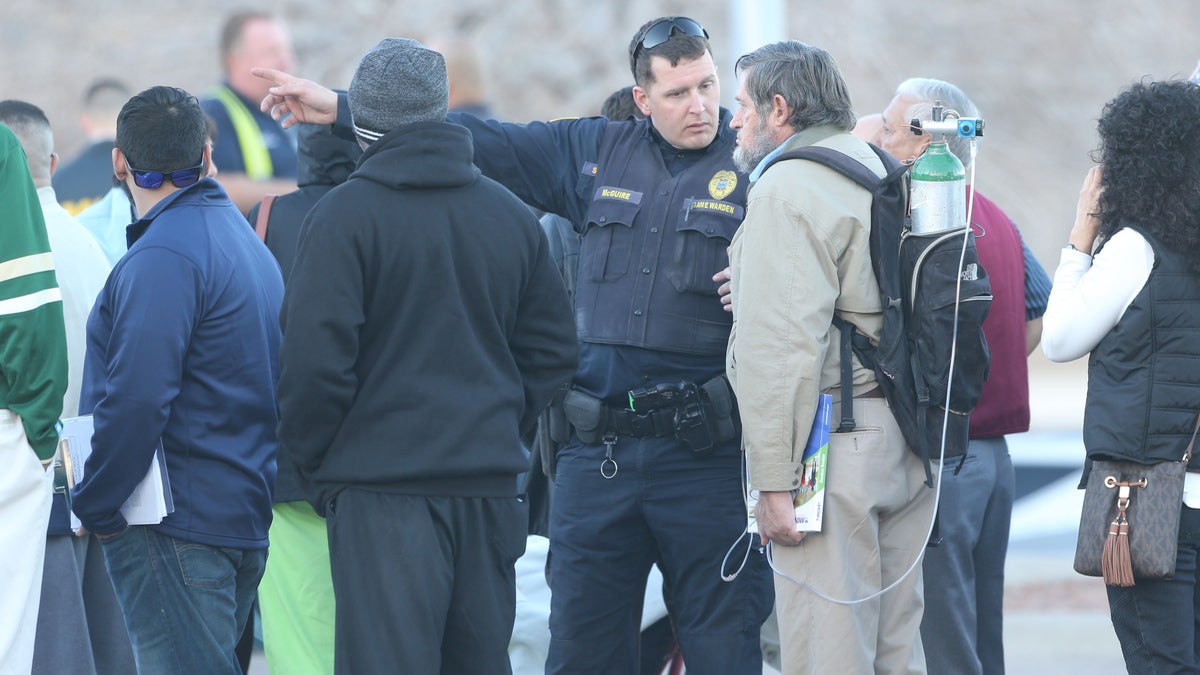
Jan. 6, 2015: A law enforcement officer talks to a man with an oxygen tank who was one of many waiting to be debriefed about a shooting inside the El Paso, Texas VA. (AP)
Four months after security was revamped at Fort Bliss, the sprawling West Texas Army post is again ramping up efforts after a shooting at a veterans clinic in which a former worker killed a psychologist before committing suicide.
Fort Bliss increased random vehicle searches and checks of proper registration Wednesday, one day after the attack, post spokesman Lt. Col. Lee Peters said.
Officials did not have a motive for the shooting or say how the gunman — an Army veteran and former clerk at the clinic — got a .380-caliber handgun past the post's security checkpoints. They said that security measures at the clinic and the rest of the post would be reviewed for possible changes.
Even with the new checks, several gates at Fort Bliss are open to civilians, who need just a driver's license or other government identification to access the post.
Charlie Castillo, a 62-year-old plumber, said he has worked at both Fort Hood and Fort Bliss as a contractor. He found the security measures at Fort Hood to be much stricter, with vehicle searches and sweeps of his tools.
"I don't see that happening here," he said from a nearby Veterans of Foreign Wars post in El Paso. "But Fort Bliss has always been an open base."
The renewed questions about Fort Bliss security emerged after 48-year-old Jerry Serrato entered the El Paso Veterans Affairs Health Care System clinic on Tuesday and killed Dr. Timothy Fjordbak before killing himself.
In September, Fort Bliss Commanding Officer Maj. Gen. Stephen Twitty announced revamped security measures after a military assessment found the base was not fully in compliance with Department of Defense directives. Those included more random vehicle checks and limiting access to Defense Department personnel at some gates.
Officials on Wednesday would not go into specifics about possible changes now under consideration or say how long the newly increased checks would remain in place.
Meanwhile, the FBI — the lead agency in the shooting investigation — has not yet determined what prompted the attack.
Douglas Lindquist, who heads the FBI's El Paso office, said Fjordbak had reported that Serrato threatened him at an El Paso supermarket in 2013. Lindquist said Serrato had some sort of perceived or real grievance against Fjordbak.
Both men worked at the VA at the same time in 2013, but authorities do not believe they had a working relationship, Lindquist said. There also was no immediate indication the gunman was a patient.
Fjordbak was a psychologist who left private practice after the Sept. 11 terrorist attacks because he wanted to work with military veterans, officials said. Serrato had served in the Ohio Army National Guard from 1985 to 1993, then enlisted in the Army in July 2006.
Felix Ruiz Jr., 67, a Vietnam veteran who lived next door to Serrato, said he talked to the gunman a few times and knew he had a weapon in his home.
"One time he warned me that sometimes at night he couldn't sleep and would walk around with his gun," Ruiz said. "I told him that was fine as long as you don't shoot my head off."

